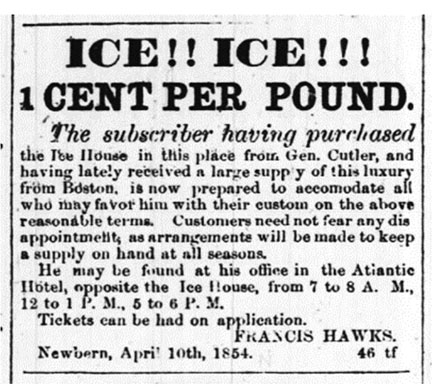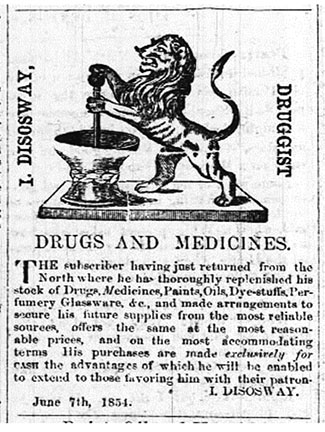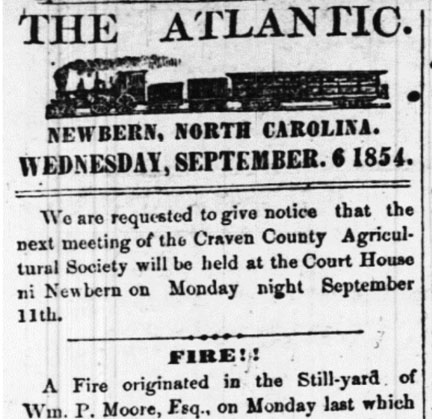“Drowned. Mr. Henry Brinkley, who for a number of years drove the stage from Newbern, was drowned on last Saturday about 9 o’clock,” reported The Atlantic, a New Bern newspaper March 8, 1954. “He had just started from the new County wharf, in a Wood Boat, to go to his farm down the river, and when but a few yards from the wharf, was knocked overboard by the main boom and drowned.”
The “editor and proprietor” of The Atlantic, C.C. Clark, sprinkled his pages with tragic news when available and availed himself quite often of exclamation marks as can be seen at right in the headline of the story about William P. Moore’s turpentine distillery fire.
Even bacon and ice got exclamation marks in The Atlantic.
The March 21, 1854 edition reported on both a “Shocking Murder” in Chapel Hill and a “Shocking Tragedy in California.”
In the first, a man named Brockwell came to the home of a family named Davis, “used some very offensive language” and was told to go away by Mrs. Davis. When he didn’t, he was accosted by Mr. Davis who was quickly stabbed to death. The newspaper reported “the murderer is a worthless drunken loafer, but his victim was a highly respected mechanic and member of the Methodist Church.” The newspaper lamented: “Here is another depressing sacrifice to the rum fiend! How long before the people will rise up and put a stop to his insatiate bloodthirstiness?”
The California tragedy involved an Indian attack on a group of white and Chinese prospectors and describes, in grisly detail, slaughter, crushed skulls and dismemberment.
To this dark first impression of The Atlantic, let it be added that the paper did a good job of covering the less sensational aspects of New Bern life of the period. And though it lasted little more than a year, Mr. Clark’s publication is among the spriteliest and most stylishly designed of the many newspapers that have served the area through the centuries.

He reported the Craven County marriages of “Mr. William Fulsher, Esqr., and Miss Caroline Gaskins” by Nathan Whitford, and of Robert Lewis Fulsher to Nancy Jane Price by David P. Whitford on Broad Creek.

The passing of Mrs. Ann Gaylard, 45, the widow of the late Rev. John B. Gaylard of “the Church of Christ”, was recorded in March 1854.
A good stable of advertisers supported The Atlantic that year. J.W. Baxter is found offering bacon; Francis Hawks, ice; and druggist Israel Disosway, a wide range of medicine and household wares.

Samuel Oliver & Son had blacksmith tools for sale. William Hay on Middle Street would do “painting and gilding” of houses, signs, and coaches. Alexander Mitchell sold “Variety Goods” and insurance. Sitgreaves Attmore advertised as an attorney, and David Bell as the inspector of naval stores.
And The Atlantic even ventured into some 1854 humor.
“A dabbler in literature and the fine arts who prided himself on his knowledge and proper use of the English language came upon a youngster sitting on the banks of a mill pond …
‘Adolescence,’ [he said] ‘art thou not endeavoring to entice the finny tribe to engulf into their denticulated mouths a barbed hook upon whose point is fixed a dainty allurement?’

‘No,’ said the boy. ‘I’m fishin’.”
by Edward Ellis, Special Correspondent

